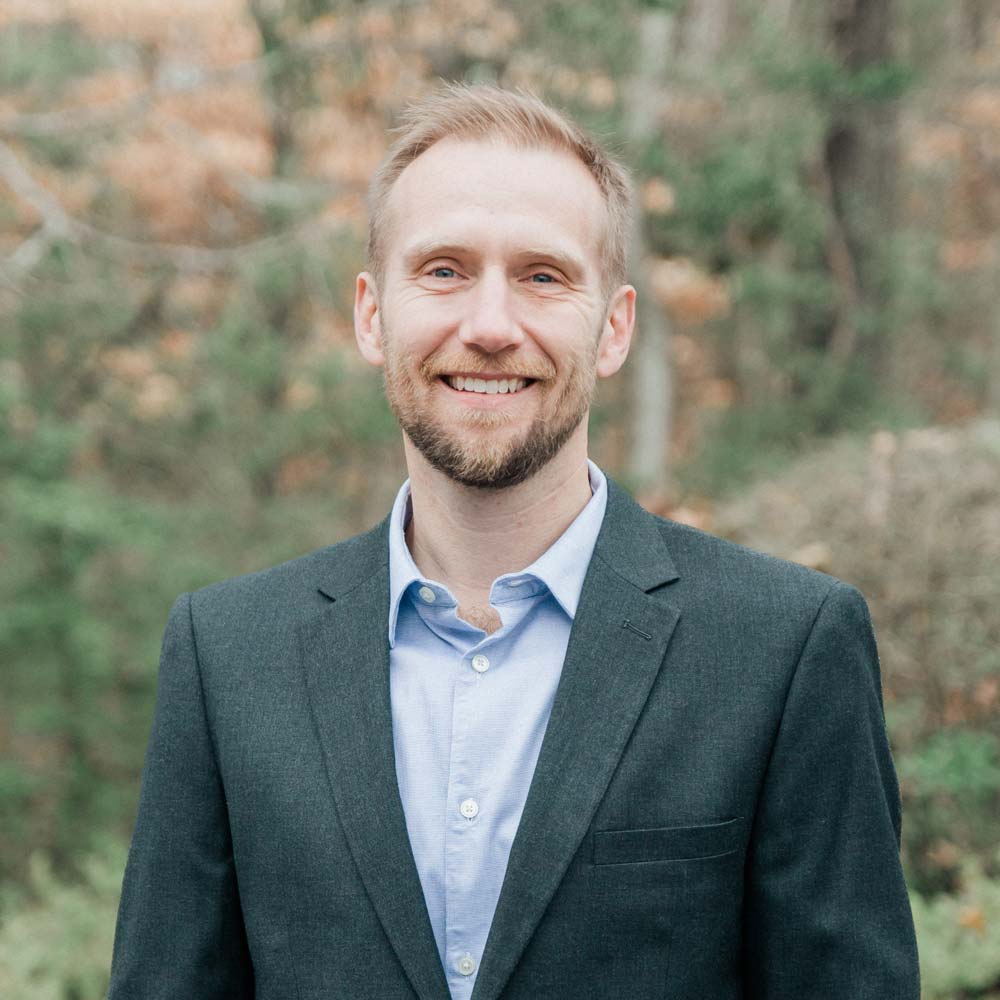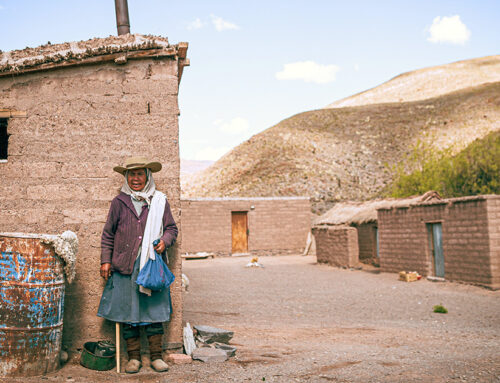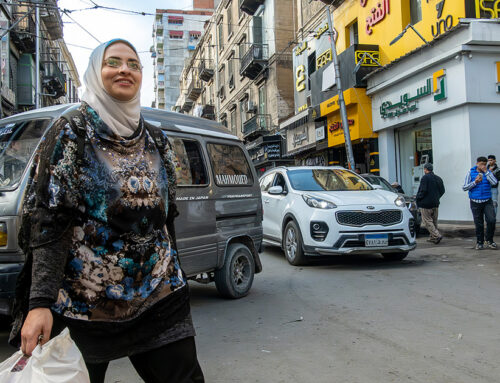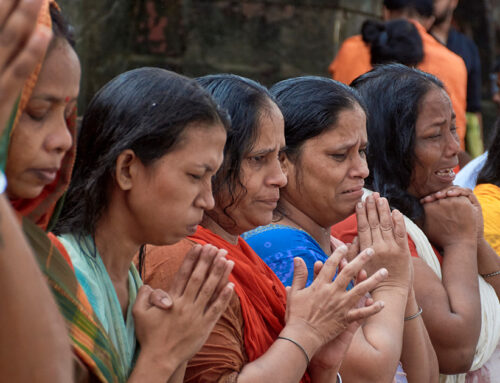Thought Leaders on Global Mission
Dr. Tyler Lenocker is Haggai International’s vice president of global research. He researches global trends impacting evangelism, missions, Christianity, Christians, and the global Church to inform the strategy, processes, and programs of Haggai International and its national ministries to increase its effectiveness in achieving its mission and vision. Dr. Lenocker is tasked with developing initiatives that position Haggai International as a thought leader in global missions for decades to come.
A thought leader is a person or organization who, through their always expanding expertise and experience, guides and inspires others to promote change and innovation within and beyond their field. Thought leaders cultivate expertise, create community, promote innovation, and change the world. After more than 50 years of equipping indigenous leaders through its world-class Haggai Leader Experience, Haggai International is equipped to be a thought leader in global missions. Building on Dr. John Edmund Haggai’s pioneering vision for equipping indigenous missionaries, our organization stands ready to promote globally developed and directed thought leadership that cultivates innovations in holistic witness on emerging Gospel frontiers.
Since I began at Haggai International in August 2022, there are three things I have learned about Haggai leaders that make me excited about our organization’s future as thought leaders in global mission.
1. Haggai possesses perhaps the most culturally and denominationally diverse network of missionaries in the world, all rooted in the non-West.
Innovations arise when different voices are brought together around a shared vision, and our leaders are engaged in thousands of distinct cultural contexts and united by a commitment to the Gospel of Jesus Christ. Not only is our network diverse, but the diversity exists on the frontiers of faith where there is greatest need for the transformative power of the Good News. I believe that Christian vitality is found on the missionary periphery, where the body of Christ is following its Savior, in love, into a broken world. Our leaders are living and laboring in these peripheral places of need and opportunity.
2. Haggai possesses a global network of primarily lay ministers.
Why does having mostly lay ministers matter for thought leadership? Unlike most Christian equipping organizations who primarily equip people for pastoral or church planting roles — a narrower vocational focus — Haggai equips people pursuing a multiplicity of roles, from business owner to politician to professor. These diverse vocations provide a broader range of ways leaders are innovating methods and mindsets in their engagement in Gospel witness. Furthermore, lay leaders are fully “in the world” in ways that pastors often are not able to be. Lay leaders’ implicit understanding of their contexts, then, are unsurpassed. As an organization, we have an opportunity to tap into the collective wisdom and contextual knowledge of our leaders and allow them to help us stay on the cutting edge of global trends in world mission.
3. Haggai leaders are engaged in holistic witness.
Holistic witness is bearing witness to the Gospel in word, way of life, and work in the world. It’s witness to a Gospel that produces personal and social transformation. Why does this matter for thought leadership? Over the last decades, global missions have been moving away from Western models that often divided the mind and body, the spiritual and the social, to more biblical models promoting the transformation of all of life. Haggai possesses a network of leaders already performing this integrated ministry and can serve as examples for the broader missions community. Leaders proclaiming and demonstrating a holistic Gospel also possess a unique knowledge of the holistic sin and brokenness found in their contexts. This knowledge leads them to develop innovative, transformative, and sustainable ministries addressing true personal and communal needs, ministries that more fully unveil the hope and rescue found in the Gospel.
With these three realities in mind, I can’t wait to see how Haggai and our thousands-strong global network emerge as pioneering thought leaders in global missions!

Dr. Tyler Lenocker
Vice President, Global Research
Thought Leaders on Global Mission
Dr. Tyler Lenocker is Haggai International’s vice president of global research. He researches global trends impacting evangelism, missions, Christianity, Christians, and the global Church to inform the strategy, processes, and programs of Haggai International and its national ministries to increase its effectiveness in achieving its mission and vision. Dr. Lenocker is tasked with developing initiatives that position Haggai International as a thought leader in global missions for decades to come.
A thought leader is a person or organization who, through their always expanding expertise and experience, guides and inspires others to promote change and innovation within and beyond their field. Thought leaders cultivate expertise, create community, promote innovation, and change the world. After more than 50 years of equipping indigenous leaders through its world-class Haggai Leader Experience, Haggai International is equipped to be a thought leader in global missions. Building on Dr. John Edmund Haggai’s pioneering vision for equipping indigenous missionaries, our organization stands ready to promote globally developed and directed thought leadership that cultivates innovations in holistic witness on emerging Gospel frontiers.
Since I began at Haggai International in August 2022, there are three things I have learned about Haggai leaders that make me excited about our organization’s future as thought leaders in global mission.
1. Haggai possesses perhaps the most culturally and denominationally diverse network of missionaries in the world, all rooted in the non-West.
Innovations arise when different voices are brought together around a shared vision, and our leaders are engaged in thousands of distinct cultural contexts and united by a commitment to the Gospel of Jesus Christ. Not only is our network diverse, but the diversity exists on the frontiers of faith where there is greatest need for the transformative power of the Good News. I believe that Christian vitality is found on the missionary periphery, where the body of Christ is following its Savior, in love, into a broken world. Our leaders are living and laboring in these peripheral places of need and opportunity.
2. Haggai possesses a global network of primarily lay ministers.
Why does having mostly lay ministers matter for thought leadership? Unlike most Christian equipping organizations who primarily equip people for pastoral or church planting roles — a narrower vocational focus — Haggai equips people pursuing a multiplicity of roles, from business owner to politician to professor. These diverse vocations provide a broader range of ways leaders are innovating methods and mindsets in their engagement in Gospel witness. Furthermore, lay leaders are fully “in the world” in ways that pastors often are not able to be. Lay leaders’ implicit understanding of their contexts, then, are unsurpassed. As an organization, we have an opportunity to tap into the collective wisdom and contextual knowledge of our leaders and allow them to help us stay on the cutting edge of global trends in world mission.
3. Haggai leaders are engaged in holistic witness.
Holistic witness is bearing witness to the Gospel in word, way of life, and work in the world. It’s witness to a Gospel that produces personal and social transformation. Why does this matter for thought leadership? Over the last decades, global missions have been moving away from Western models that often divided the mind and body, the spiritual and the social, to more biblical models promoting the transformation of all of life. Haggai possesses a network of leaders already performing this integrated ministry and can serve as examples for the broader missions community. Leaders proclaiming and demonstrating a holistic Gospel also possess a unique knowledge of the holistic sin and brokenness found in their contexts. This knowledge leads them to develop innovative, transformative, and sustainable ministries addressing true personal and communal needs, ministries that more fully unveil the hope and rescue found in the Gospel.
With these three realities in mind, I can’t wait to see how Haggai and our thousands-strong global network emerge as pioneering thought leaders in global missions!

Dr. Tyler Lenocker
Vice President, Global Research
Thought Leaders on Global Mission
Dr. Tyler Lenocker is Haggai International’s vice president of global research. He researches global trends impacting evangelism, missions, Christianity, Christians, and the global Church to inform the strategy, processes, and programs of Haggai International and its national ministries to increase its effectiveness in achieving its mission and vision. Dr. Lenocker is tasked with developing initiatives that position Haggai International as a thought leader in global missions for decades to come.
A thought leader is a person or organization who, through their always expanding expertise and experience, guides and inspires others to promote change and innovation within and beyond their field. Thought leaders cultivate expertise, create community, promote innovation, and change the world. After more than 50 years of equipping indigenous leaders through its world-class Haggai Leader Experience, Haggai International is equipped to be a thought leader in global missions. Building on Dr. John Edmund Haggai’s pioneering vision for equipping indigenous missionaries, our organization stands ready to promote globally developed and directed thought leadership that cultivates innovations in holistic witness on emerging Gospel frontiers.
Since I began at Haggai International in August 2022, there are three things I have learned about Haggai leaders that make me excited about our organization’s future as thought leaders in global mission.
1. Haggai possesses perhaps the most culturally and denominationally diverse network of missionaries in the world, all rooted in the non-West.
Innovations arise when different voices are brought together around a shared vision, and our leaders are engaged in thousands of distinct cultural contexts and united by a commitment to the Gospel of Jesus Christ. Not only is our network diverse, but the diversity exists on the frontiers of faith where there is greatest need for the transformative power of the Good News. I believe that Christian vitality is found on the missionary periphery, where the body of Christ is following its Savior, in love, into a broken world. Our leaders are living and laboring in these peripheral places of need and opportunity.
2. Haggai possesses a global network of primarily lay ministers.
Why does having mostly lay ministers matter for thought leadership? Unlike most Christian equipping organizations who primarily equip people for pastoral or church planting roles — a narrower vocational focus — Haggai equips people pursuing a multiplicity of roles, from business owner to politician to professor. These diverse vocations provide a broader range of ways leaders are innovating methods and mindsets in their engagement in Gospel witness. Furthermore, lay leaders are fully “in the world” in ways that pastors often are not able to be. Lay leaders’ implicit understanding of their contexts, then, are unsurpassed. As an organization, we have an opportunity to tap into the collective wisdom and contextual knowledge of our leaders and allow them to help us stay on the cutting edge of global trends in world mission.
3. Haggai leaders are engaged in holistic witness.
Holistic witness is bearing witness to the Gospel in word, way of life, and work in the world. It’s witness to a Gospel that produces personal and social transformation. Why does this matter for thought leadership? Over the last decades, global missions have been moving away from Western models that often divided the mind and body, the spiritual and the social, to more biblical models promoting the transformation of all of life. Haggai possesses a network of leaders already performing this integrated ministry and can serve as examples for the broader missions community. Leaders proclaiming and demonstrating a holistic Gospel also possess a unique knowledge of the holistic sin and brokenness found in their contexts. This knowledge leads them to develop innovative, transformative, and sustainable ministries addressing true personal and communal needs, ministries that more fully unveil the hope and rescue found in the Gospel.
With these three realities in mind, I can’t wait to see how Haggai and our thousands-strong global network emerge as pioneering thought leaders in global missions!

Dr. Tyler Lenocker
Vice President, Global Research















